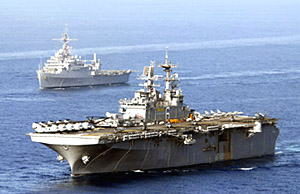2 early predictors of Iran action

U.S. Central Command fuel orders 'more than double' the norm
GERTZ - ABU DHABI — The U.S. is organizing increased fuel reserves in the Gulf, giving rise to speculation about military preparations in the region.
Sources said the U.S. Central Command has increased orders of fuel for naval vessels deployed in the Gulf. They said Centcom, in cooperation with the U.S. Navy's Fifth Fleet, plans to establish a huge fuel reserve with supplies that could last more than two months.
 |
| Ships from the U.S. Fifth Fleet on patrol in the Persian Gulf region. cusnc.navy.mil |
In November, the U.S. Navy's Military Sealift Command, or MSC, issued tenders for four tankers to transport at least one million barrels of fuel for aircraft and surface vessels. The tankers were meant for Gulf ports and operations in the region.
Over the last two years, MSC has usually placed orders for one or two tankers per month for operations in Iraq and the Gulf. The Fifth Fleet has been based in Bahrain and is responsible for operations in the Gulf.
The sources said the tankers would transport fuel from such Gulf Cooperation Council countries as Qatar and the United Arab Emirates to Bahrain. They said fuel would also be acquired from Saudi Arabia, which raised its annual allocation to the U.S. military from 1.5 million barrels in 2006 to nearly eight million in 2007.
The U.S. Navy has sought to maintain at least two carrier strike groups in the Gulf. In mid-November, the navy conducted exercises in anti-mine and anti-submarine warfare.
"More fuel means more activity, and this could be the beginning of something," the source said.
The United States has not cited the fuel shipments as part of military preparations in the Gulf. On Monday, U.S. Defense Secretary Robert Gates said the best way to confront Iran's nuclear weapons program was through international diplomatic pressure. Gates said military force should remain a last resort.
"We are engaged in diplomacy with Iran," Gates said. "The administration has made clear that it is prepared to have broader dialogue if [the Iranians] make commitments to stop enriching."
- “we Can Replace U.s. As Guarantor Of Regional Security”
Iran.No really.Iran has proposed a regional cooperation council that would focus on military and security cooperation.A former senior Iranian official told a Gulf conference that Teheran and its new ally, Iraq, could help their Gulf Arab neighbors...
-
Emirates 24/7: US Navy: Iran prepares suicide bomb boats in Gulf By Reuters Published Monday, February 13, 2012 Iran has built up its naval forces in the Gulf and prepared boats that could be used in suicide attacks, but the US Navy can prevent it...
- Iranians Claim To Perfect Swarm Strategy, Will Destroy Us Navy
Iran claims exercises with 1,000 speedboats have perfected 'swarm strategy' GERTZ - NICOSIA — Iran's military reported it had achieved a fleet of 1,000 speedboats as part of a swarm strategy to overcome U.S. naval superiority in the...
- Hassan Nasrallah Is Proved Right - What Will Be The Consequences?
U.S. signaling Gulf states it will withdraw from region by 2009 ABU DHABI — The Bush administration has hinted through diplomatic channels that the United States will leave Iraq and most of the Gulf region by 2009. Middle East diplomatic sources said...
- Iran's Navy Developing Swarm Strategy Against U.s. Warships
From Gertz, excerpted The Iran navy has procured hundreds of fast patrol boats as part of what is believed to be a swarm strategy to overcome the firepower of U.S. cruisers and destroyers. Gulf analysts said the Islamic Revolutionary Guard Corps has...
